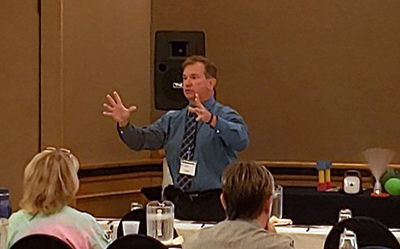 Menu
Menu

By Kate Friend, BA ’07
If you were to look for a UD major that promises great future job opportunities, classics might not be the most intuitive choice. Fluency in ancient languages might be useful in the medical field (though not as useful as, say, pre-med), but at first glance it seems to have limited application for real-world careers. However, classics alumni will tell you that four years spent translating Greek and Latin doesn’t just ensure knowledge of those languages; it also instills the discipline of rigorous analysis, which is applicable everywhere, while fostering an understanding of the human condition through the awareness that people always have been, and always will be, just people.
Raymond Heipp, Ph.D., BA ’86, has put his classics major to good use designing assistive technology and facilitating its use for the public. He credits his UD classics major with giving him role models who have been lifelong inspirations, and with providing “the opportunity to explore texts in their native languages to give me a better understanding of the wholeness of humanity.”
Assistive technology (AT) is technology that helps people with disabilities navigate the abled world. Heipp cites the example of glasses and contacts as assistive technology that most people are familiar with. “These items are assistive technology in that they help those of us with vision issues to ‘see’ better and live our daily lives to our fullest extent,” he explained. “Other forms of assistive technology do the same!”
Heipp works to help school districts, therapy centers and hospitals understand what AT is available and how to use it to support their students and patients. Historically, AT has been “an afterthought with a random approach to supporting various individuals,” he explained. The technology is becoming more well-defined, but there is still progress to be made. Heipp’s mission is to get the outside world to understand that there is no such thing as a “one-size-fits-all approach” to assistive technology, saying that approaches such as repurposing old AT to become a natural part of classroom environments “begins to create a transparency for AT so that it does not create an aura around anyone using it later as having ‘something wrong with them.’”
The task of normalizing assistive technology is all about creating inclusive environments where people with disabilities can be seen for what they bring to the table, not just for their disability. This is why Heipp uses the example of glasses when teaching this concept. Glasses are simply assistive devices that are so common that people don’t even think of them as assistive, nor of glasses-wearers as being disabled. And yet, take away someone’s glasses and they would, in fact, be functionally disabled.
Other, less-common forms of assistive technology also simply support people to be able to accomplish their goals regardless of their disabilities. Because of the stigma surrounding disabilities, though, it is harder for people who use less-common forms of assistive technology to be seen for their abilities and strengths. Heipp relates his goal for his work in assistive technology to his UD days, saying, “All assistive technology enables individuals to ‘actualize their potential’!”
Heipp credits UD with making him the person he is today. UD gave him a strong foundation in faith and family, as well as a vision of all of us as “one human family,” with “the utmost faith that we will get through all pitfalls in this world to unite as one.”
Honoring the professors who influenced him and made his UD experience what it was, Heipp cites a catalog of intellectual heroes. Father Placid L. Csizmazia, O. Cist., was “always that humble sage whose wisdom permeates through the years,” and convinced Heipp to take Euclidean and non-Euclidean geometry because it was “true to our classical roots!” Meanwhile, Associate Professor and Chair of Classics David Sweet’s, Ph.D., “demeanor and ability to take the passages of ‘dead languages’ as some called them and relate them to modern humanity always has stayed with me,” and Grace West, Ph.D., “expected much, but also knew the strength of compassion.” Sybil Novinski embodied the way in which women can be strong and powerful, and the depth to which people should care for one another, while Professor of Physics Richard Olenick, Ph.D., and Professor Emeritus of History Tom Jodziewicz, Ph.D., demonstrated that any subject area could relate to an individual’s life, regardless of major, which formed the basis of a view of the holistic person that has informed his work ever since. Finally, James Fougerosse, Ph.D., BA ’67, of the Rome Program, modeled how to be proud of oneself while maintaining a servant leader mentality.
For Heipp, the lasting value of his UD education was not just the coursework, but more importantly the people who influenced his life. “My interactions with my role models at UD have brought me to understand that all of our roles are important to the world, as we are the ones who translate the stories of individuals to future generations,” he said.